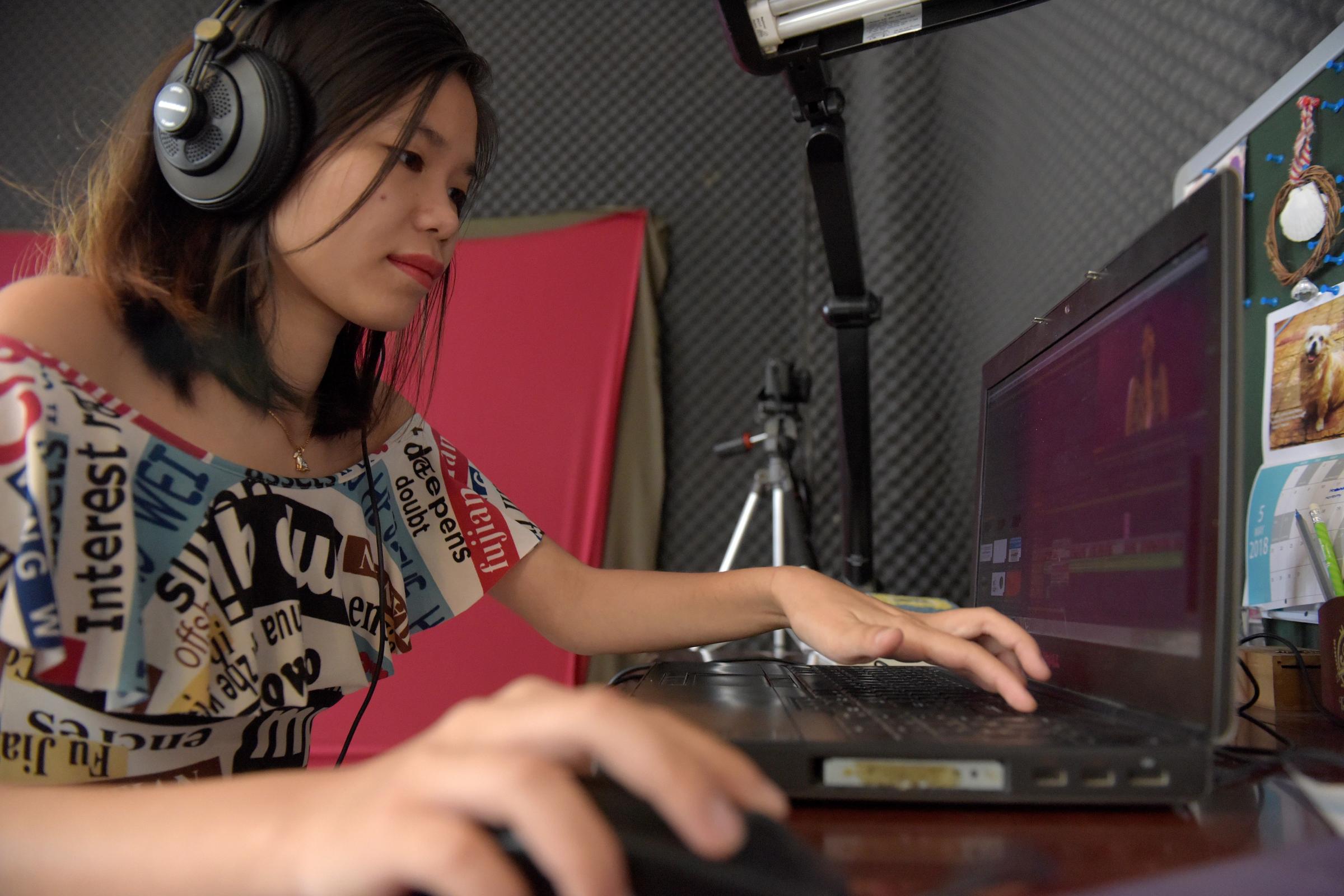
Seated in a classroom on the bucolic fringes of Cambodia’s capital, three dozen teenagers put a radically new term to the test: affirmative consent.
Armed with only scissors and a definition, they are instructed to separate a list of scenarios – persistent requests for a kiss, drunken smooches, physical advances on a subordinate – into whether each is consensual or not. A debate ensues.
“No!” insists Venghour, a lanky 16-year-old who raises his arms above his head in emphasis. “If it’s reluctant then it’s not consent.” Behind him, a female classmate nods, picking out a lonely example for her consensual column.
It might sound like awkward, difficult territory to engage a sea of uniformed teens spanning the pubescent spectrum. But from the front of the room, Catherine V. Harry, a sprightly 23-year-old feminist activist, deftly guides the Gen Zers.
“Consent,” she says, on the sweltering afternoon of the tutorial, “is an enthusiastic, voluntary agreement before any sexual activity.”
Harry is at the forefront of a sexual revolution buzzing through Cambodia, one that takes cues from the women’s liberation movement, as well as the current, global #MeToo zeitgeist, but is also very much a homespun effort. A cohort of young activists are pushing back against the hangover of colonial morality, gendered expectations and deeply patriarchal norms epitomized by the local proverb that women, like cloth, are easily tainted.
“It’s the right time to talk about consent in Cambodia because we can see the rest of the world is having this conversation around MeToo, and we can use that as the spark to talk about the sexual assault and harassment issues that are happening here,” Harry says.

Cambodia has not yet had its own MeToo moment (“Women could lose not just their jobs, but their lives,” Harry says). But that hasn’t stopped Harry and others from opening the floodgates to some of the parallel shifts around gender equality and sexual relationships, and introducing the new language – like affirmative consent – available to discuss it.
In the West, affirmative consent only became a guiding credo of sexual behavior relatively recently. The term, pioneered by Antioch College students more than two decades ago, initially met with ridicule. But by the time it caught on, and the only a “yes means yes” mantra eclipsed “no means no” the conversation around sexual relations, entitlements and excesses had shifted, catalyzing new legislation, as well as the #MeToo and #TimesUp movements.
In Cambodia, Harry describes herself as trying to kick-start a nationwide conversation about consent in a country she calls “50 or 60 years behind” in terms of women’s rights. Mainly, she wages her fight online, connecting to Cambodia’s youthful population on the platform they are most plugged in to: Facebook. More recently, she’s also increasingly ventured offline to facilitate public presentations and school dialogues, hoping to address an educational void around sexual rights, health and conduct.
Harry started her blog, “A Dose of Cath” when she was just 17. What began as an outlet to vent her frustrations about gender inequality evolved into a platform to educate fellow young Cambodians about everything from contraception to menstruation and masturbation. She has now amassed more than 250,000 followers and one of her videos, about obsession with women’s virginity, has been viewed more than 2 million times.
Broaching these topics has necessitated inventing new language. Harry says there is no comparable term for “affirmative consent” in Khmer, while feminism literally translates as “bias toward women.”
“In Cambodia, women face difficulty getting information about sex and are not supposed to talk about it in public. Even between mothers and daughters sex is not really discussed,” Ros Sopheap, head of advocacy group Gender and Development for Cambodia, tells TIME.
In the tiny nation where just 40 years ago the genocidal Khmer Rouge regime decimated nearly a quarter of the population, U.N. agencies have highlighted sexual violence as a critical problem. Cambodia has among the highest rates of gang rape in the region, and even has its own word, “bauk,” for what many men regard as a recreational activity. More than 1 in 5 Cambodian men between ages 18 and 49 openly admit to having raped someone, and more than half were just teenagers at the time, according to a 2013 U.N. survey. In the majority of cases, the men cited the belief that they have a right to sex with a woman regardless of her consent.
And yet, only 126 rapes were reported in the first six months of 2017 in a kingdom of 16 million people. Sex education, or the lack thereof, could be part of the problem.
Elements of sexual health have been a part of the national curriculum since 1998 when HIV/AIDs prevention was incorporated. But Cambodia has yet to roll out a comprehensive, nationwide sexual education curriculum. Public schools meanwhile continue to teach excerpts from a moral code for women, known as Chbab Srey, which instruct women to walk lightly, serve and satisfy their husbands.
At school, Harry says her teachers said sexual education was not important. At home, she found the topic equally verboten. Harry sees this enforced ignorance as enabling sexual violence. “How can women fight rape or sexual harassment if they don’t understand what that is?” she says.
Harry points out that popular culture in Cambodia trivializes sexual assault and domestic violence by depicting it in comedic terms. In a crude, popular joke that has aired on TV, a mother asks her daughter why she didn’t call out for help when she was being raped. In what’s meant to be the punch line, the girl responds that her mouth was busy.
Meanwhile the government has banned songs about adultery and last year slapped an actress with a yearlong moratorium from TV for dressing in revealing clothing. “We have restrictions on women appearing sexy, but no restrictions on depictions of violence against women,” Sopheap of Gender and Development for Cambodia, says.
When incidents of violence against women are reported, Harry says authorities tend to reinforce victim blaming by suggesting a woman’s “life-style, clothes, sexual desire or who she is with provokes rape.” Police reports often detail what the victim was wearing, while lawyers say judges, the vast majority of whom are male, routinely ask victims what they did to invite the abuse.
It also doesn’t help that many rapists never face legal consequences. The U.N. survey of the confessed rapists found that 66% of those arrested had their charges dropped.
“Our culture focuses on teaching women not to get raped, but doesn’t teach men not to rape,” Harry says.
While many NGOs assist survivors, Harry aims to change what she sees as prevailing attitudes of entitlement and cultural norms underpinning sexual violence. She hopes by fostering an understanding that intimacy requires explicit, mutual consent, women will no longer feel subservient.
Women’s rights groups and government surveys say women’s limited control over their own sexuality underpins everything from marital rape and the prevalence of sexual coercion among teens on Valentine’s Day, to the comparatively high rate of married women living with HIV and possibly the recent rise in teen pregnancies.
“The term ‘consent’ is not discussed, which means that women are not empowered. Women are seen only as objects to which men are entitled,” says Seng Reasey, a women’s rights advocate at local NGO Silaka. “We need more people like Catherine who can open up the discussion about sexual rights.”
Attempting to rewrite Cambodia’s sexual mores has earned Harry praise as well as tremendous backlash. “If I got a dollar for every time someone said I was ruining Khmer culture I would be a millionaire,” she jokes. But she adds that the MeToo movement has motivated her to “put her armor on.”
“It makes me feel like part of a collective group fighting against sexual harassment and sexual assault,” she says.
At the private school campus on the outskirts of Phnom Penh, students called Harry’s lesson revelatory, offering them concrete language for conversations they didn’t know they needed to have. “For girls, it will give them more courage to state what they want,” says Makara, 16.
For Harry, this is a victory. “Hopefully we can start by making people more aware of consent, and then move on from there,” she says.
More Must-Reads from TIME
- Donald Trump Is TIME's 2024 Person of the Year
- Why We Chose Trump as Person of the Year
- Is Intermittent Fasting Good or Bad for You?
- The 100 Must-Read Books of 2024
- The 20 Best Christmas TV Episodes
- Column: If Optimism Feels Ridiculous Now, Try Hope
- The Future of Climate Action Is Trade Policy
- Merle Bombardieri Is Helping People Make the Baby Decision
Write to Laignee Barron / Phnom Penh, Cambodia at Laignee.Barron@time.com